
This post covers the following points:
“Wikipedia - Where the research begins and ends” 😎.
Wikipedia! The big daddy for all students, scholars, researchers and also the marketers like us. God knows how I would have cleared my exams, if Wikipedia wasn’t there. Thanks Wikipedia 🙌
Talking about today, most of the search queries we type on Google, contain a Wikipedia link in the SERP.
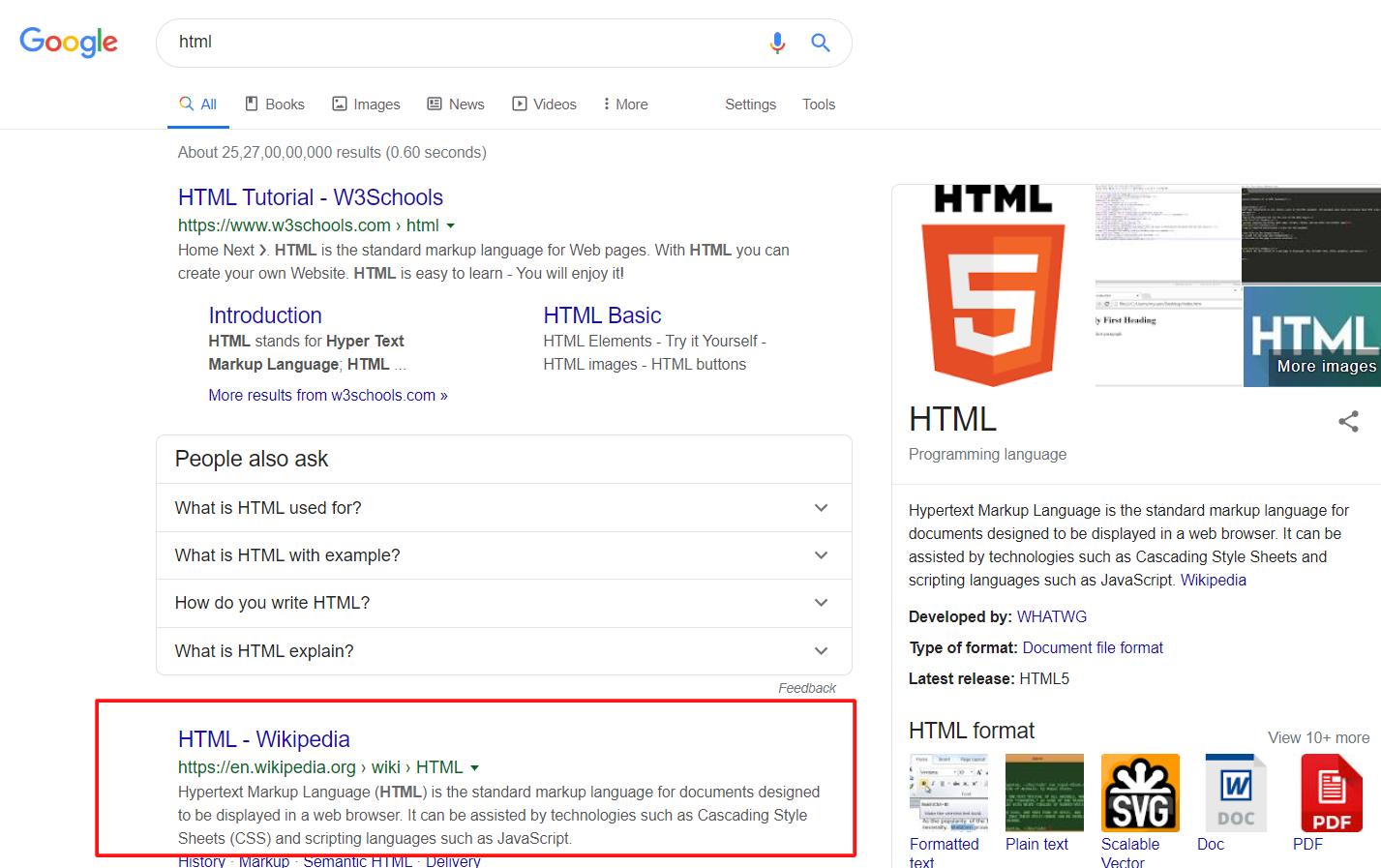
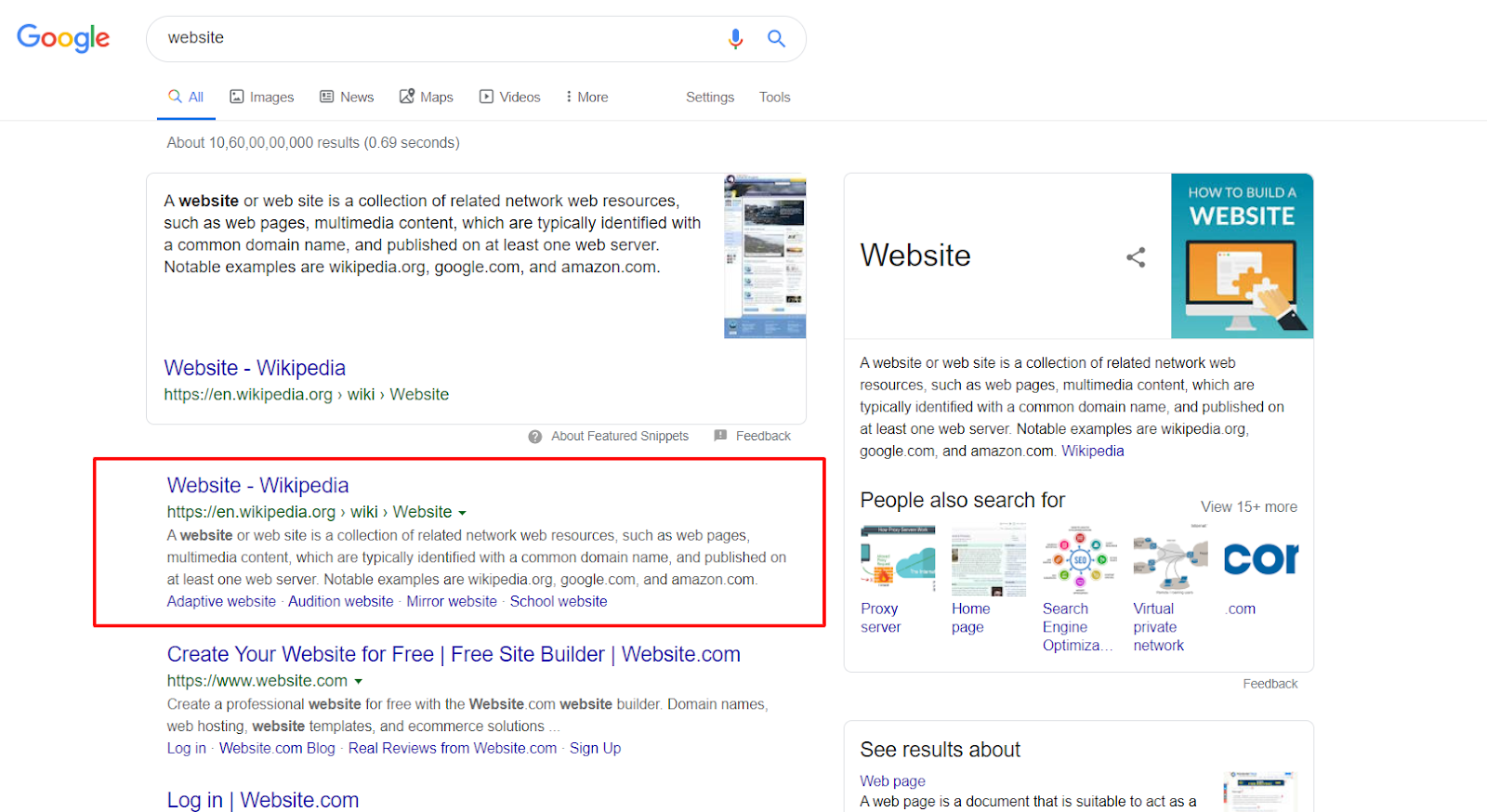
After all, there is a reason it is known as Encyclopedia of Internet.
No wonder, the site gets 20 billion page views per month. Huge 😮
Wait, here are some more numbers to surprise you.
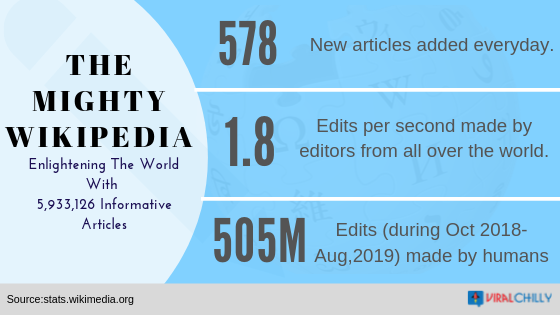
Since, it is a free encyclopedia of Internet maintained by its readers, anybody can create or edit the content on Wikipedia. Even if you don’t have an account, Wikipedia allows you to contribute from your IP address.
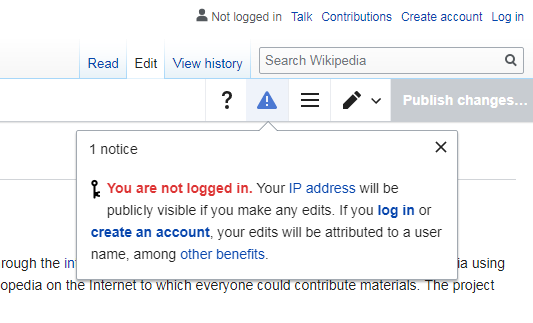
Since most of you already know the huge benefits of building Wikipedia links, I am going to keep it short. Afterall, this is not the prime reason you are reading this post 😛
Being Google’s one of the favorite sites (because of the authority it has), Wikipedia has immense benefits from SEO point of view.
Having a wiki backlink means:
These four points are also the ultimate goal of any successful SEO strategy and having a Wikipedia backlink serves all of them. What else do you wish for?
Note: FYI, Wiki links are nofollow and unless you are living under a rock, Nofollow links too add value to site and when it is from Wikipedia, a single link can bring drastic changes.
Before We Start
Wikipedia is a community for the people by the people. Do not think of it as a link farm. When creating backlinks from Wikipedia, always make sure to Be a giver, add value to whatever you contribute.
What if a spammy content/ link added by you come through your son working for school project. You wouldn’t like your son to consume wrong information would you?
If you plan to add any irrelevant content for the sake of getting backlink, you must drop the idea. Wikipedia is the place for very high authority content.
If possible, pay Wikipedia back. After all, It’s a site run by donations. Be a humble part of their donation campaigns. Here is the link.
Warming Up your Wikipedia Account
Do you know a Wiki moderator or user has the authority to check the entire history/contributions of any other user?
Yes, they do. And if they find only bad edits, false claims and promotional links, further edits made from that account are never likely to get approved.
That’s where this process of warming up your account steps in. The hack here is to offer value to the community first. Just like we do on Quora (or any other online community site), contribution comes before promotion. Wikipedia is no different.
It is all about Giving back to the community.
Wiki moderators always welcome insightful content and citations that helps to grow the community.
Hence once you have created an account on Wikipedia, don’t jump upon promoting your blog or webpage directly. Instead focus upon building authority first and that will happen only by posting valuable content without expecting anything back.
Wondering how? Let me share how you can warm up your Wikipedia account:
Warming up your account this way gives it a good authority in the eyes of moderators. Populate your account with such edits before trying to add your promotional link.
Here is a quick history of my account.
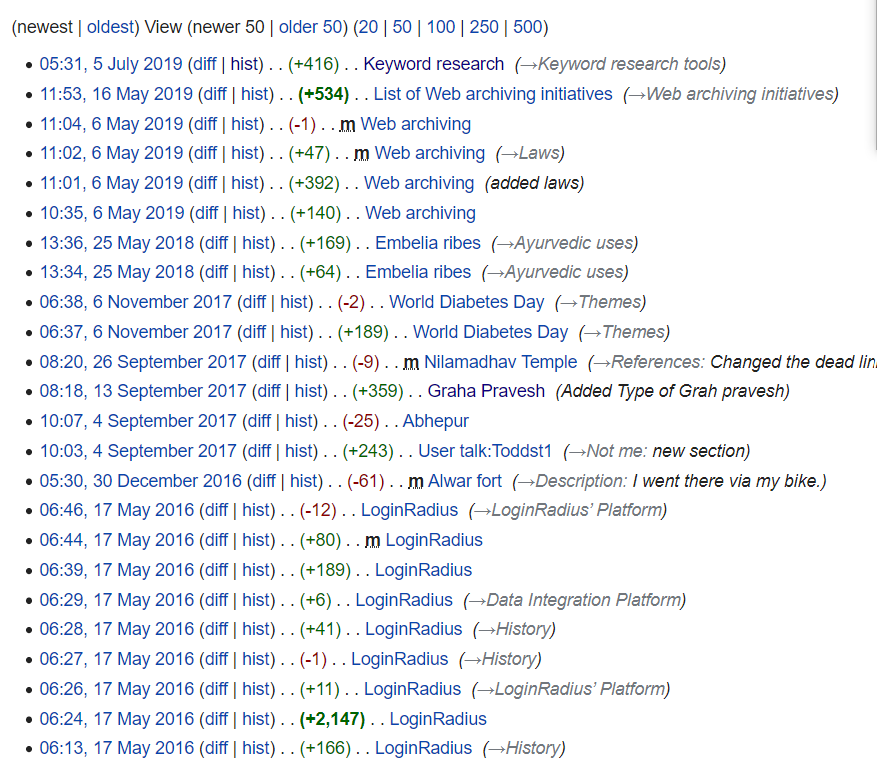
Once your account is warmed up and you are all set to put your first attempt to get a wiki backlink, let’s jump to the real meat.
There are three ways to acquire a backlink from Wikipedia:
Let’s go through all of these processes one by one.
Just like any other website on the internet, Wikipedia too contains a lot of pages with broken links.Wondering what’s in there for you? Well, a great opportunity to replace this broken link with yours. Here’s how!
You would be surprised to know but Wiki moderators have made an archive for the Wikipedia pages having dead links inside. Isn’t it great? All you have to do is to check them one by one and see where your link suits best. Sounds easy, right?
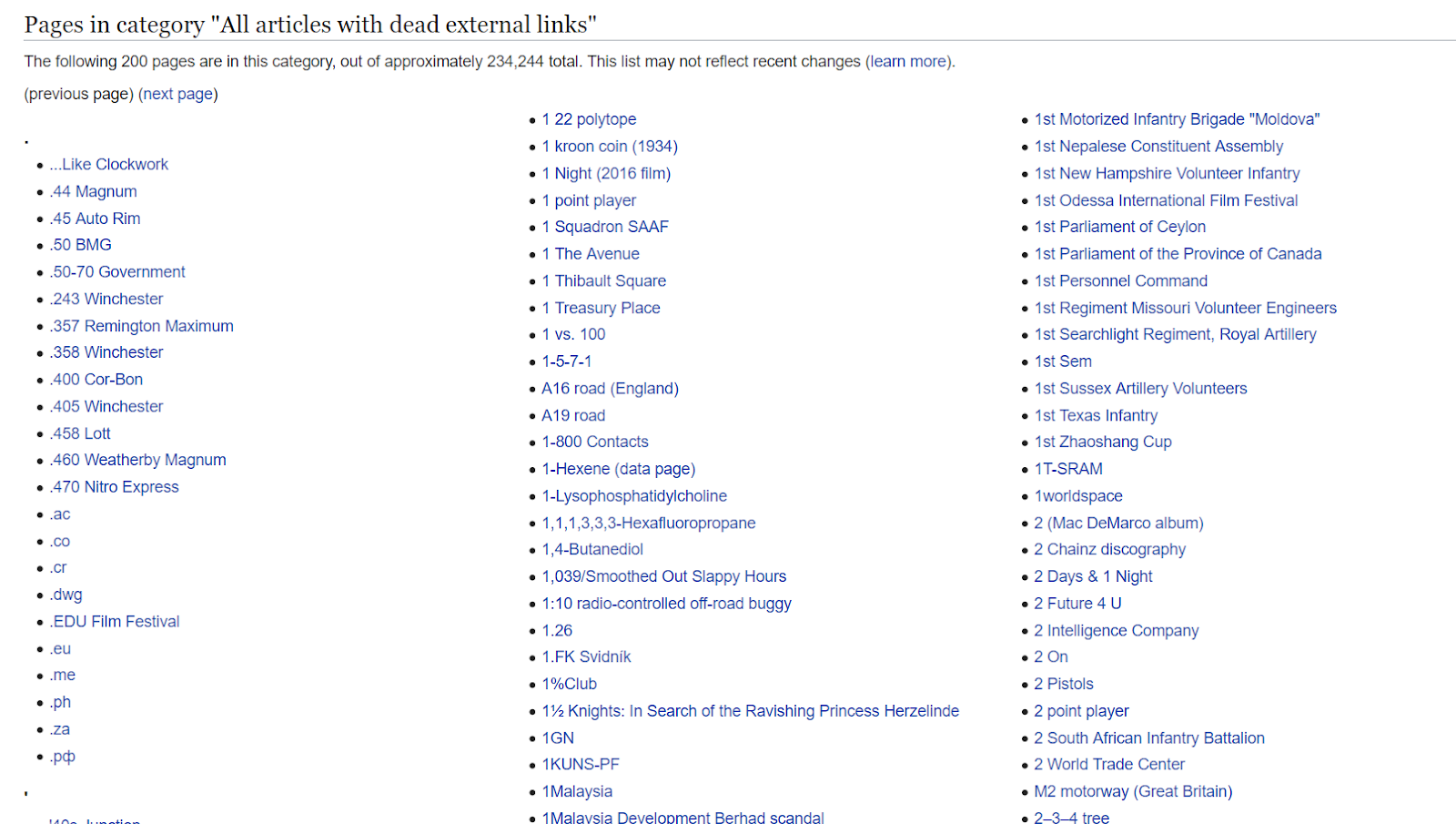
However, as opposed to being handy, it is rather a time consuming task to manually sift through all the pages in the find of a suitable one for you.
But, don’t worry, Google holds your hand here with its advanced search options. Let’s have a look, how Google does it.
There are some common footprints to be used with Google advanced search queries that help you with finding a Wikipedia page which is in need of editing. Some of these are:
Type a Google search query in the following format and Google will fetch you a list of Wikipedia pages that need backlinks.
For example, here I have used the following search query for this post.
site:Wikipedia.org “marketing” “deadlink”
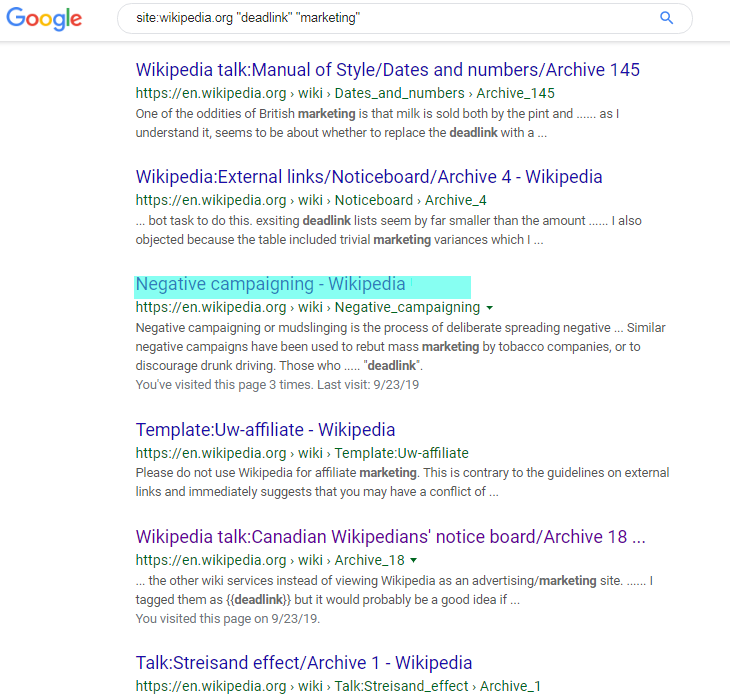
With an extensive list before you, the next step for you to do is to find the most relevant page that you can add your link to.
For me, this page of “Negative Campaigning” (highlighted in Blue) is a great opportunity for my edits. You are most likely to find deadlinks in the references below the main content. Just like I did! (Highlighted in Blue)

When you find the one that looks fit, move ahead with the further process.
Since I am not a big fan of using tools here, I am not adding any. For me, tools tell only half of the story and I believe in complete execution. However, if you want, you can try WikiGrabber for the purpose.
The next step is to check the history of dead link. Because, without checking what the links was about, you can’t be sure of your relevancy, right?
Wayback Machine can help you with this. Use the Wayback Machine to extract the original content.
Simply type the dead URL into the Wayback machine to track its history. This is what I got when I checked for my dead link here.
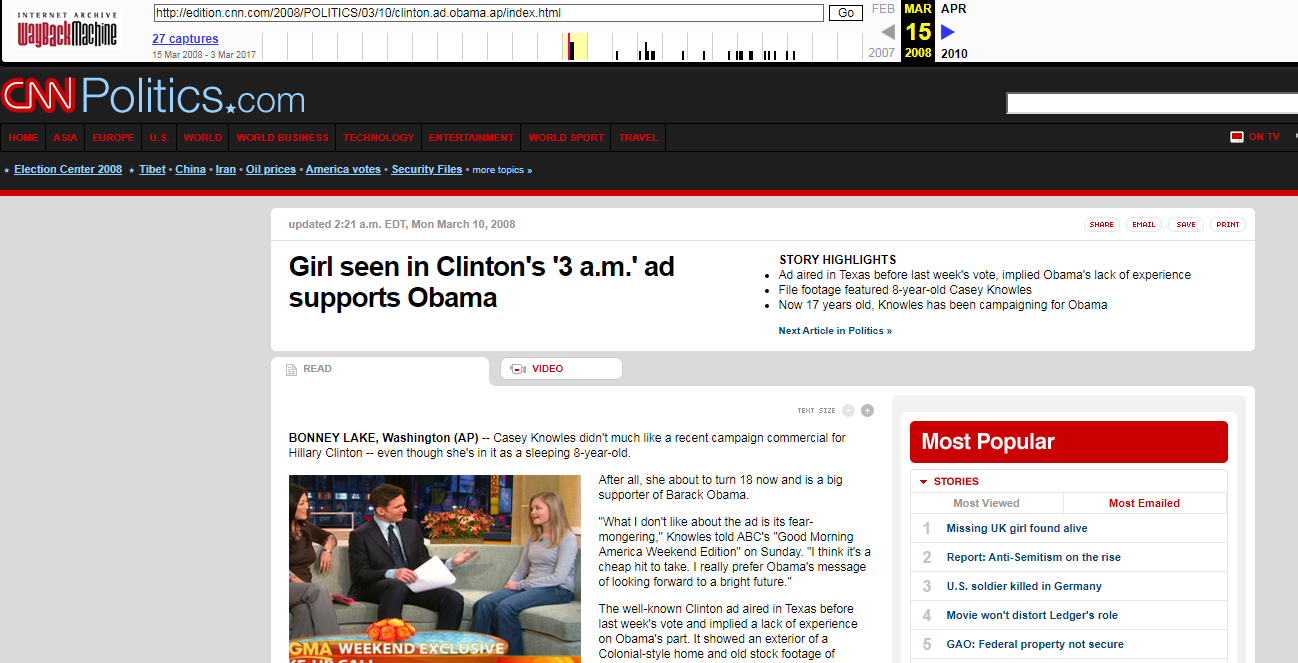
Similarly, you too need to check the dead link for what it used to contain before it went dead. This is essential to get a clear idea of what information you should include in order to get a fast approval from moderators. It works as an overview for you.
Don’t write a content just for the sake of getting a backlink. I understand that no matter how much we deny, that’s our end goal but if you ignore quality, this link won’t stick around for long.
You need to make sure your link is backed by high quality content that aligns with your blog voice and theme. Be relevant and follow all the aspects that Wiki moderators are expecting from a content. Here’s how you can do that:
Be a giver:
As I have mentioned before, Wikipedia is a community by people, for people. If your sole purpose is to get a backlink, it won’t work out. Wikipedia is known for providing value, be a part of it. Do a value addition first and you will notice that getting a backlink isn’t that difficult.
Quality is never optional:
As they say, if your attention to quality is overlooked, things will soon start falling apart. Wikipedia is no different. Here’s how you can ensure quality:
Back it up with extensive research:
Wikipedia is known for having well researched content. To that end, if your plan is to add any fluff over there, I suggest you drop the idea. Here’s how you can present your content as the authoritative one:
The last and the final step is to edit the wiki page. I am doing it with my registered account here(you can pick any option here, the process remains same).
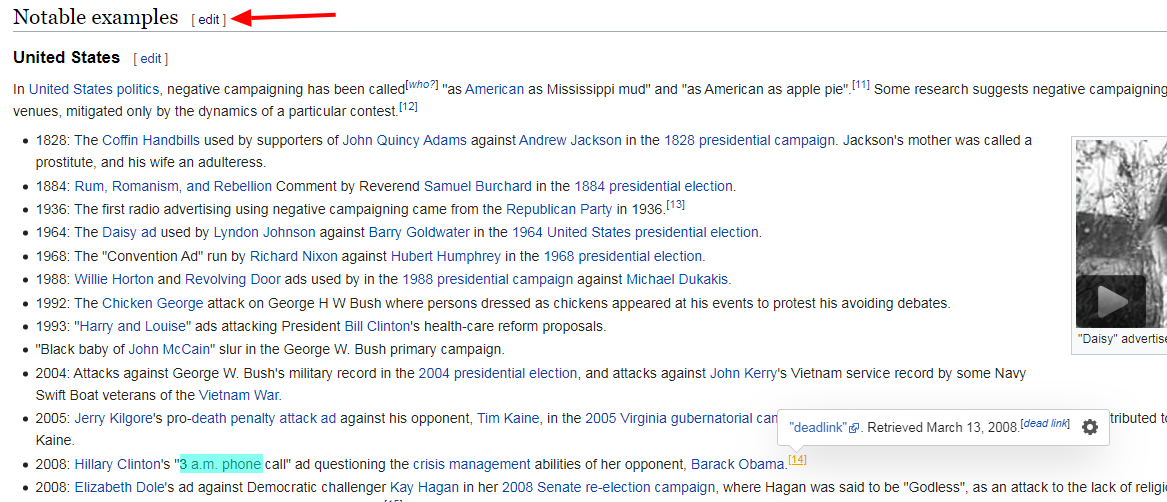
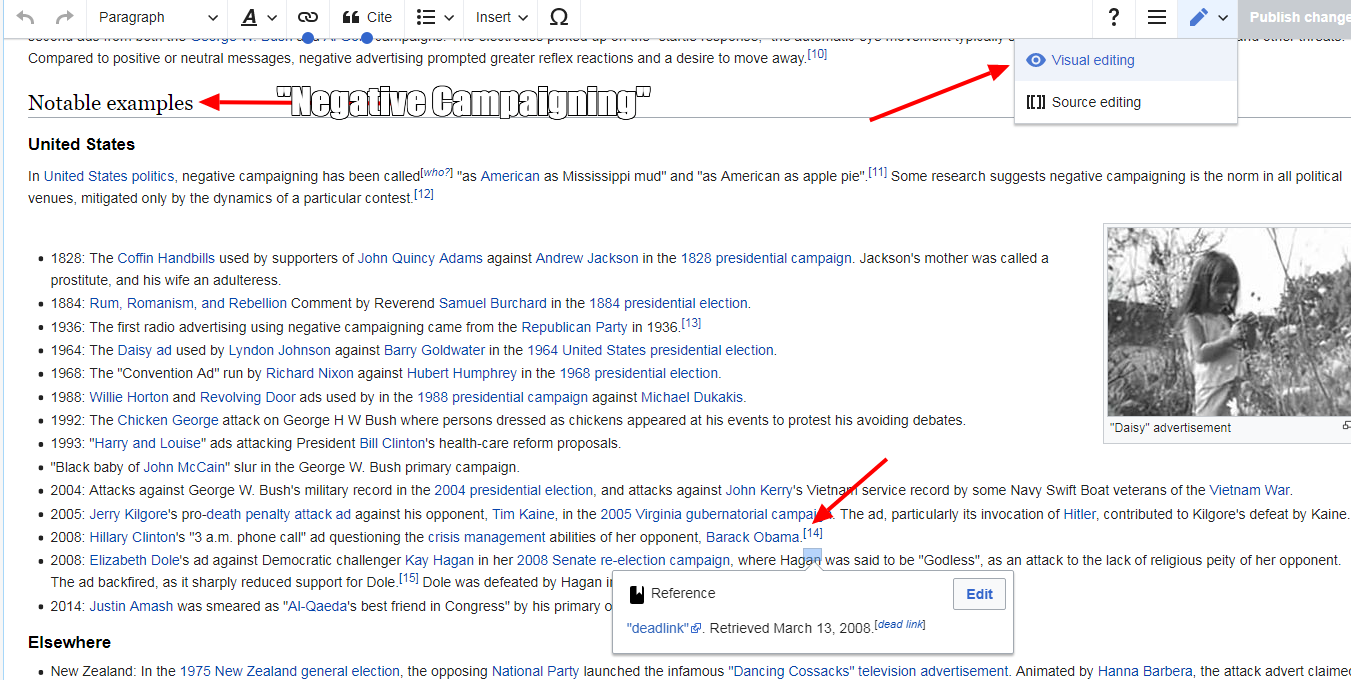
Since I am much more comfortable with visual editing, I prefer visual one. You can prefer whichever format you are comfortable with.
Next, you need to go to your desired text and click on the link you want to edit.
This will open up the editing window, similar to this one.
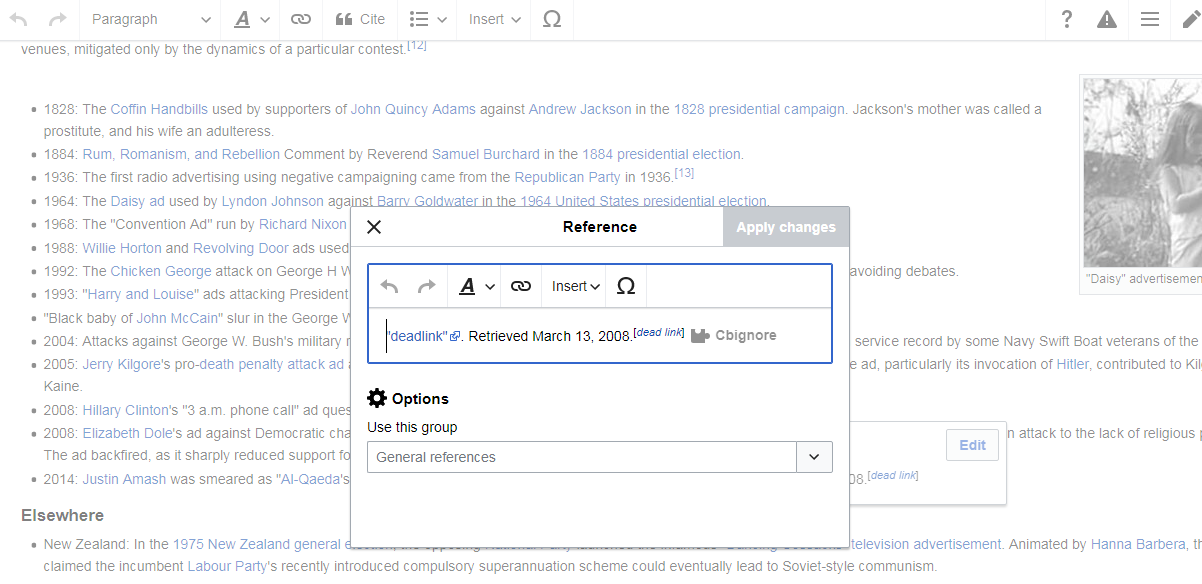
Before saving the edits, Wikipedia asks for your description for the links you’ve made. You don’t get much space here, so be as clear and as direct as possible. This is where you can explain editors why the change is necessary.
Now leave everything to Wiki moderators. They take 24 to 48 hours to review your changes and approve them. Usually your edits get live right away and are moderated later on.
Keep an eye on the pages for a few days and celebrate, if you find your edits there 🙂
After all, you achieved a milestone here.
Another way you can get links from Wikipedia is by finding the “Relevant”Wikipedia pages that are in dire need of backlinks(read citations).
Let’s see how.
Wiki moderators have made a separate archive which currently has 133,324 articles that needs expansion. If we put it in another way, moderators want their readers to be a part of Wikipedia, contribute quality content and expand the knowledge shared on that topic.
Visit this link and you will find a list of contents that are further classified according to months. Take advantage of this huge data and be a part of an endless editing.
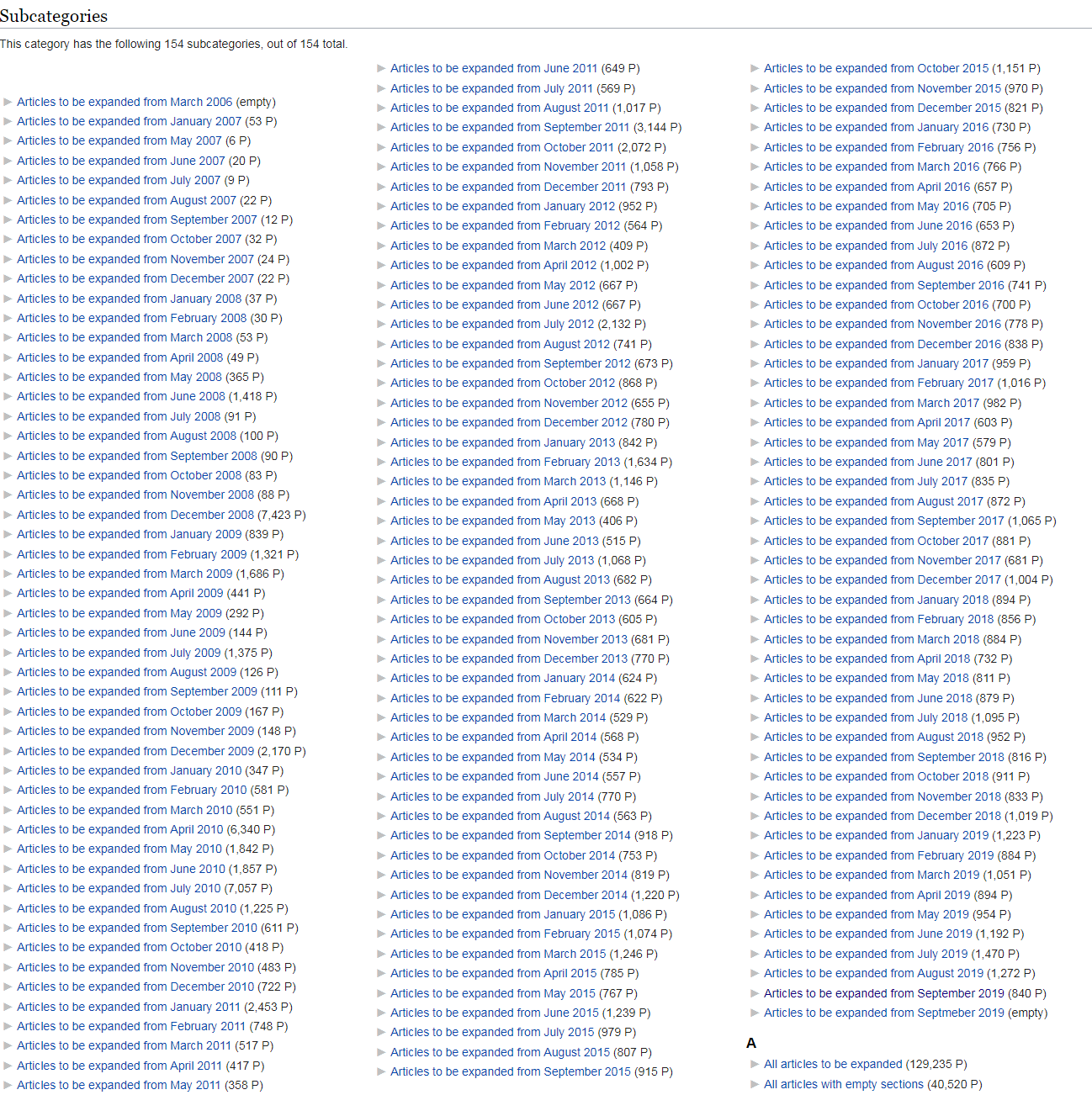
Once you have finalized a few pages that are in need of missing citations, follow the same process as mentioned above. To summarize,
You are not the only one looking for wiki backlinks out there (These are SEOs who keep looking for such links day and night!) and therefore there are high chances that you are not able to find any dead links or missing citations.
So should you leave the idea? Absolutely not!
No article is perfect. If you can find a Wiki page and add relevant content to it, it can also work as a great way to get you Wiki backlinks. Let’s get into the details to provide you a better idea.
Once you have a page and the content skeleton, go ahead and follow the previously Steps mentioned in “Method 1” above.
The best part about this approach is that you have more opportunities to get backlinks. All you have to do is to think about how you can enhance value in existing content and add value.
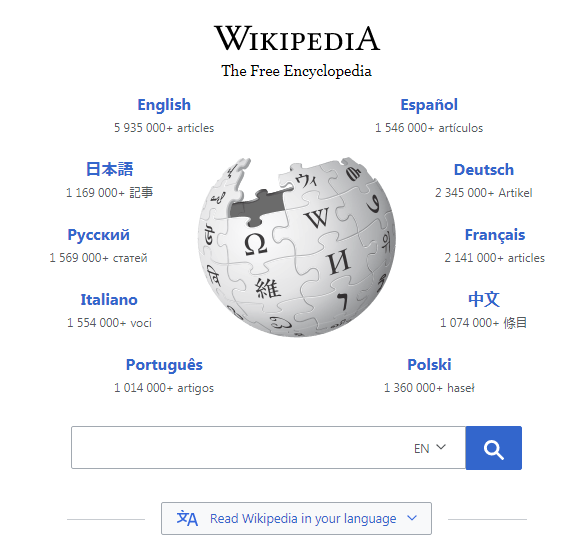
Apart from serving unlimited information in your preferred language, these regional subcommunities of Wikipedia can also play a good role in enhancing your Wikipedia link building efforts.
Think of it this way.
Let’s say I search for a term “Backlinks” at en.Wikipedia.org. You are sure to find a full length description about Backlinks here.
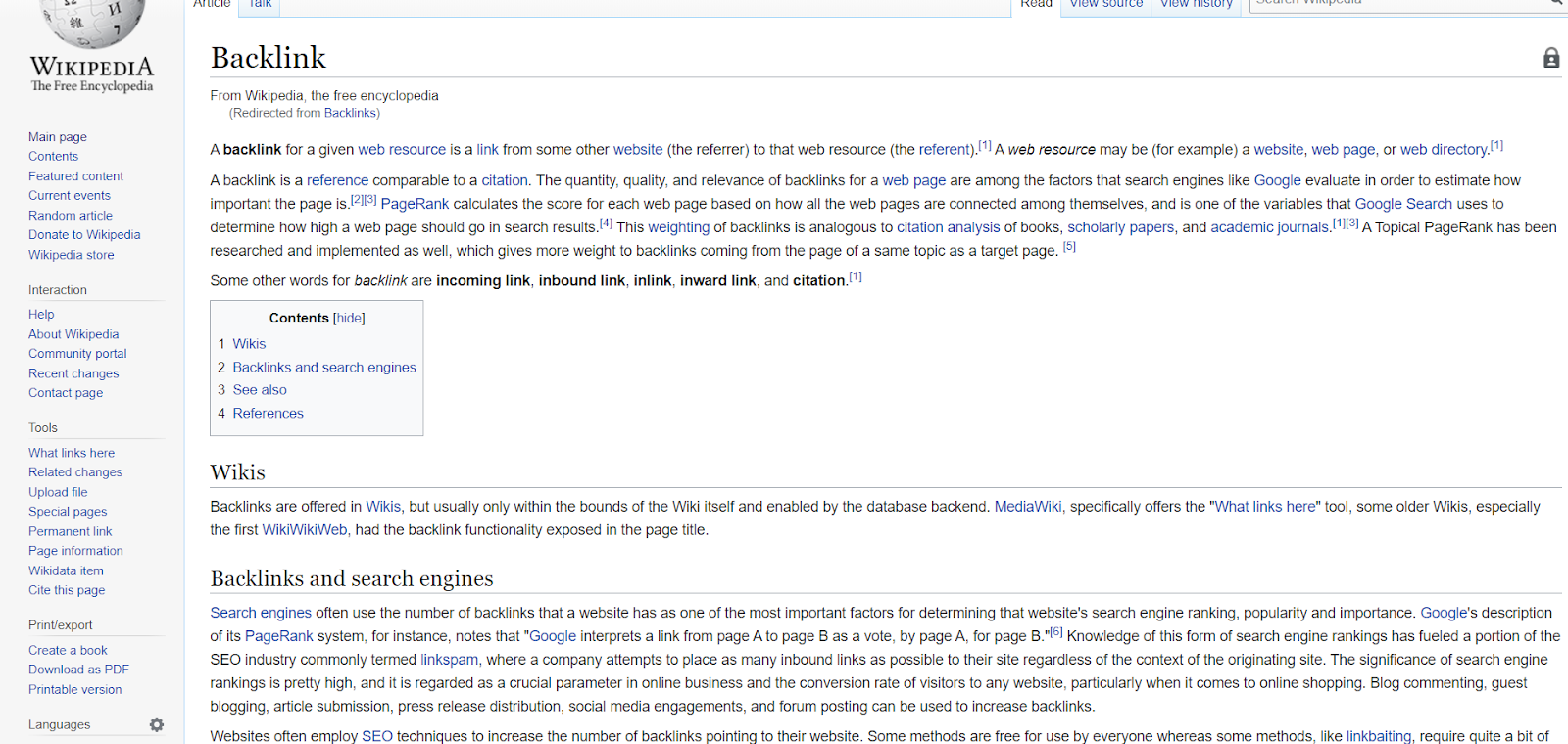
Now, just check the same term in your preferred language. I am searching “Backlinks” on https://pt.Wikipedia.org/ and this is what I found.
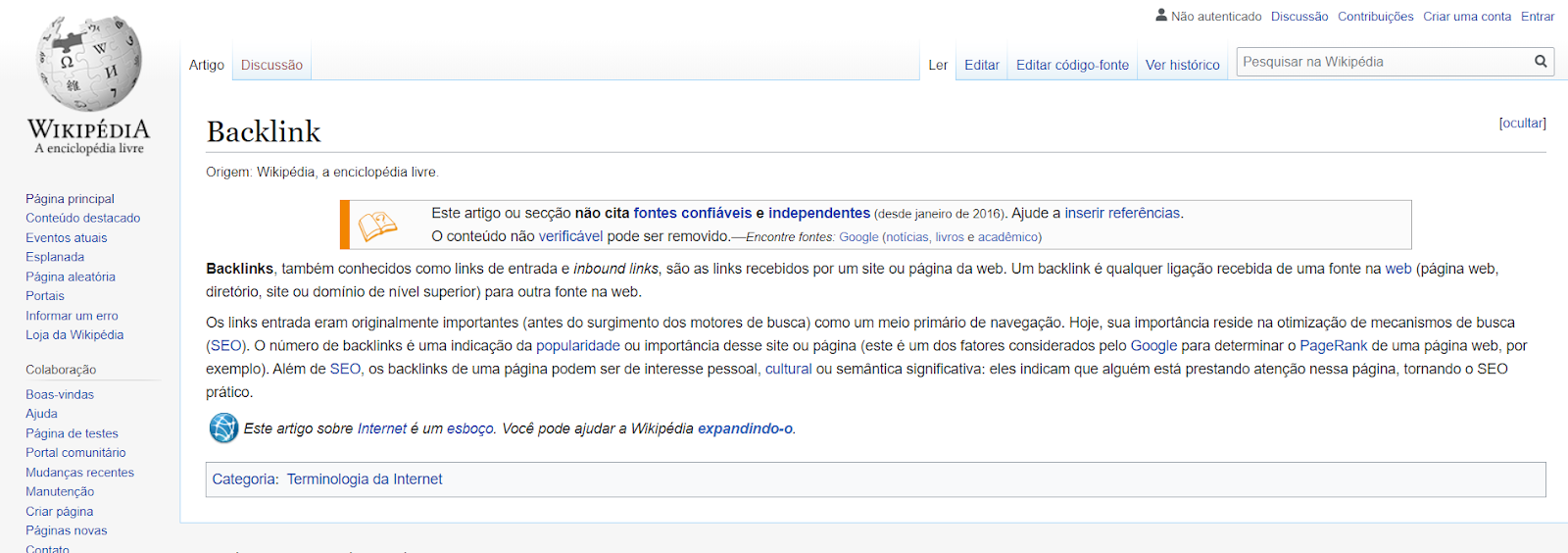
See the difference, while the English Wiki page for Backlinks is already optimized, the portuguese page? Not so much!
Same goes with https://it.Wikipedia.org/ too!
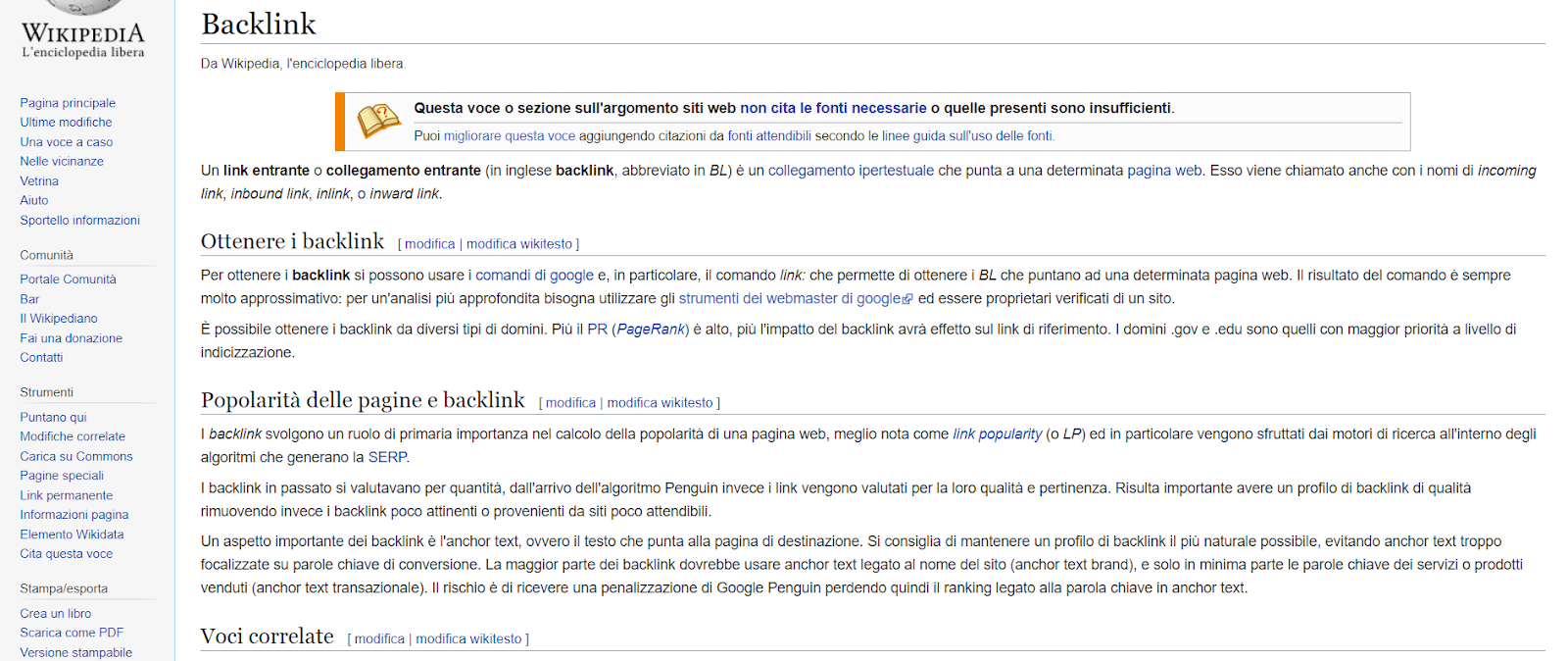
While it’s quite challenging to edit the English Wiki Page of “Backlinks”, the “Portuguese” and “Italian” gives a lot of opportunities to not only add valuable content but also one can add enough resources here.
Communities on Wikipedia maximise your scope of building wiki links. And I am sure you are less likely to find your competitors here. So why not take advantage of it, right?
Now that you are all set to put your first foot forward, let’s go through a few things that don’t work on Wikipedia:
Link building is tricky and time consuming. And when you talk about Wiki backlinks, the process requires effort and the right approach. Sometimes, we don’t have the right resources for the same and in such cases, getting expert help is actually a wise idea.
Wrapping it up!
Kudos, you are all set to build a Wiki backlink now. Though, it might be hard work initially, Wikipedia pays it off at the end. If you still have some doubts or queries, connect with us through comments. We are more than happy to be a helping hand.